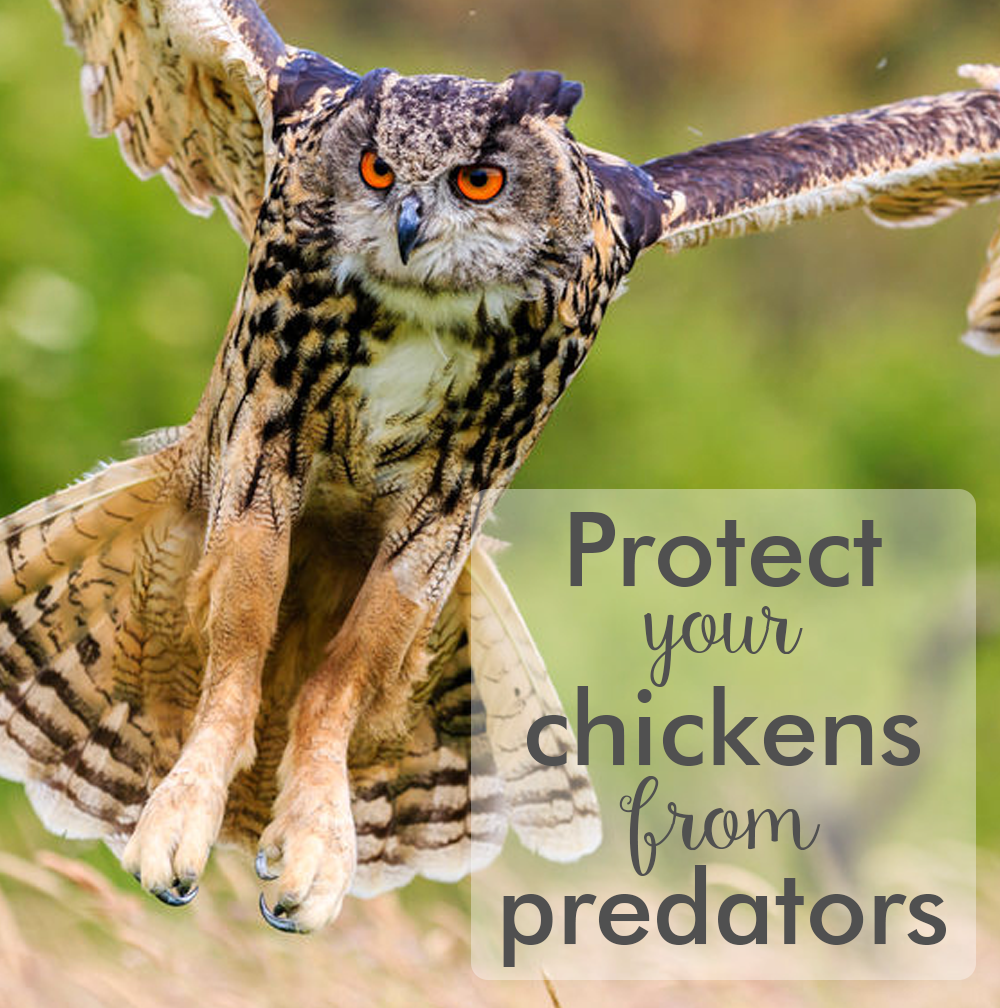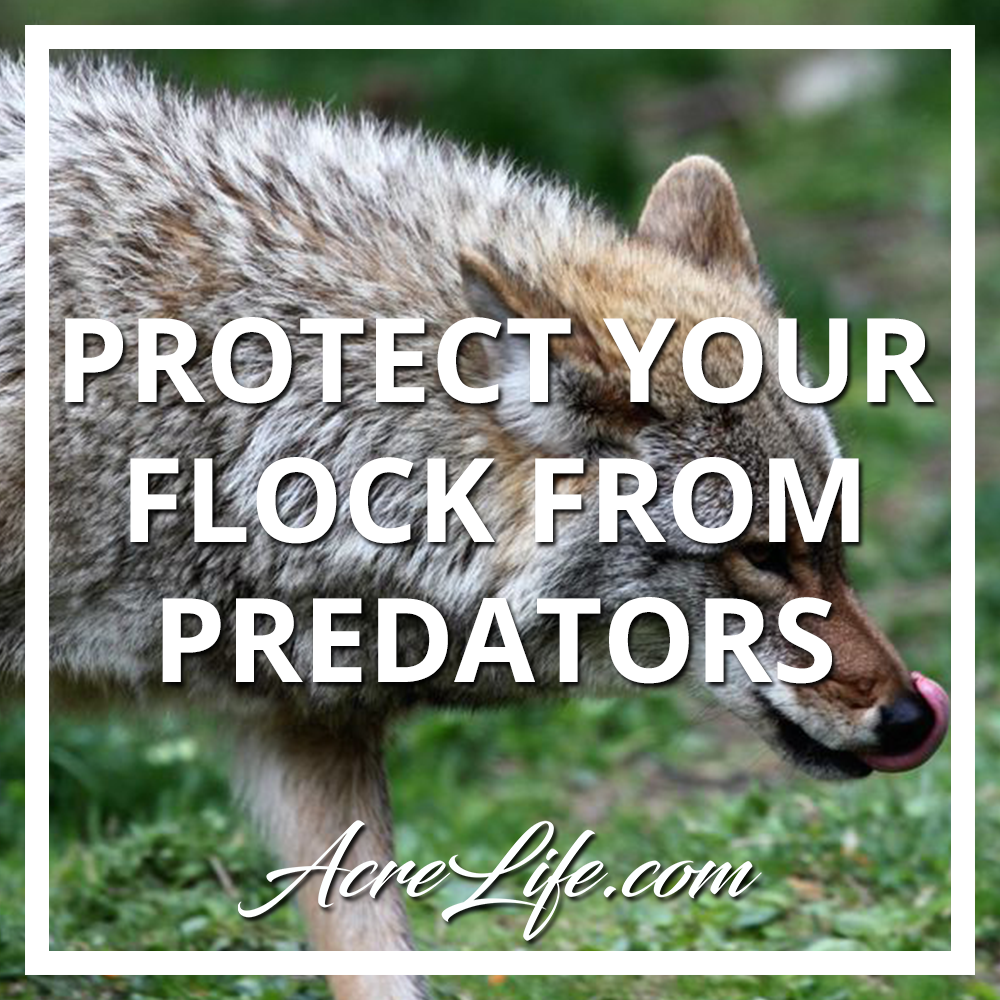
How I Failed My Flock By Not Protecting Them From Predators
One of the worst feelings I can remember was realizing that I failed at protecting our chickens from predators. The common predators of chickens that always came to mind were coyotes and owls but that’s not what got our chickens.
Dogs and Coyotes and Bobcats, Oh My!
We built the chicken mansion. We covered a 16′ x 16′ run with chicken wire so that the little chicks wouldn’t get scooped up by any overhead predators. As our flock grew we wanted to give them more space to scratch and dust bathe so we enclosed an even bigger run. Even after all of that we still wanted to spoil them by letting them free range outside of their safe confines to get the bugs that lived under the trees lining the edge of our property. On nice days we left the gate to the big run open and they would all find their way back to safety at dusk every evening. This went on for months with no incident, until we failed our flock on Christmas Eve.
Our first big attack from predators
I’m still not sure what we were thinking letting the chickens out to free range when we were going to be so far away from home (apparently we weren’t thinking). But for whatever reason, we let them out and then went to have dinner with family to celebrate Christmas. We were about an hour and a half from home when we got a call from our neighbor who said that some dogs had chased a chicken over onto their property. He chased the dogs away and said the chicken was hiding under some trees. We would not be home until it was dark to assess the damage but thanked him for chasing the predators away.
Assessing the damage
At the time of the attack, we had 24 chickens and 15 guineas. We found 12 dead chickens and 8 dead guineas when we got home. 3 chickens were missing and several had varying degrees of injury. The part that made us so mad was that it was all just a game to the dogs. After they had killed one they just moved on to the next. You never want to lose a chicken but at least when a coyote gets one they eat it. It’s the circle of life. But this was just for sport. Don’t get me wrong, we were madder at ourselves for not protecting the flock than we were at the dogs but it was a close second. We found two of the missing chickens in the trees and they were badly injured. Sadly three of the injured chickens died within a week.
Coyotes strike next (or was it a bobcat?)
We learned our lesson and kept the rest of the flock confined to their safe shelter. They were perfectly content with their confinement because they aren’t stupid, it’s scary out there! OK, they are pretty stupid and they would have happily ventured outside of their fortress if allowed. We aren’t stupid so we kept them safe. Or so we thought.
One night we had 9 chickens and the next morning we only had 2. There was no sign of struggle, meaning there were not piles of feathers. We would usually find a pile of feathers when a coyote attacked. Whatever attacked our coop left a big hole under the fence and 1 dead chicken inside of the fence. We are pretty sure that it was a pack of coyotes that came in and got the chickens while they were sleeping. That’s why there wasn’t a big struggle but we will never know for sure.
The culprit could also be the bobcat that is rumored to live around here. But for my sanity, as I walk outside at night, we’re going to assume that the rumors are false.
And then there were 2
After that attack, we were left with 2 lonely chickens and 7 mean guineas. The guineas behave when they are outnumbered. They do a good job of keeping the bugs down. They are pretty low maintenance and are a good alarm system when strangers come around. But they are also mean! So since we only had 2 chickens left to try to defend themselves against the guinea we decided to give them to a friend. Before we can properly protect a full flock we need to repair the coop. We decided that we would wait until the spring to start again. Over the winter the Oklahoma winds ripped a door off of its hinges so the remaining guineas were not completely safe at night anymore.
The ice storm that made them hungry
We had several days of ice about a month ago that made hunting for food a little difficult. My husband looked outside one morning and saw a coyote inside the run, right outside of the coop! He grabbed his Henry rifle and shot at it and watched 2 of them run for the trees. I went down later and saw the infamous piles of feathers. Some outside of the coop and some inside. Those coyotes must have just decided to have their feast inside of the coop, out of the wind and cold. Now we have 3 guineas that roam the property, hoping to see the sun come up the next day. Update – All of our guineas are gone. I like to think that they found a new home.
Predators of chickens and their characteristics
Dogs – Dogs are in it for the sport. They don’t usually eat the chickens and once they are dead they move on because the game is over.
Cats – Since cats aren’t very big they will probably only go after chicks. They will eat the meat and leave the bones and feathers behind.
Coyotes – Coyotes are nocturnal hunters, although we also frequently see them during the day. They will kill the chicken and then carry it away to be eaten.
Bobcats – Bobcats prefer to hunt at dusk or dawn. However, they will attack at any time of day if the opportunity arises. They may kill and eat the chicken right there or carry it away.
Opossums – They usually go for the eggs and leave a mushy mess where the eggs were. They may also go after chicks leaving behind a pile of wet feathers.
Skunks – Skunks also go for the eggs. They will crack open the eggs and eat the insides but leave the shell alone. They rarely go after full-size chickens but would eat chicks. You will probably also smell that they’ve been there.
Foxes – Foxes will eat the chickens and the eggs. They will probably leave a few drops of blood or feathers from the kill. They will then carry the whole chicken off to their den.
Raccoons – Raccoons will usually only eat the head but sometimes the insides.
Hawks – Hawks will attack during the day. They will most likely swoop down and grab your chicken and carry it off. If it’s a larger chicken they may just eat it right there, leaving behind feathers and the carcass.
Owls – Owls hunt at night. If your chickens are safely inside of a coop at night the owl likely won’t be able to attack. If they do get into the coop they will probably carry the chicken off and eat it somewhere else.
Snakes – Snakes typically will eat the eggs and chicks whole so they don’t leave any evidence that they were there.
How to protect your flock
Lock up your coop at night – Install a lock that is sophisticated. Make sure that nimble little raccoon fingers or the sly fox can’t figure out how to open it.
Use netting or chicken wire over the top of your run – We have 1 area that is completely covered to protect from aerial predators.
Bury chicken wire under your fence to prevent digging – We did this around our smaller run. The big extended run was too big to dig out and bury the chicken wire. Instead, we left about a foot on the ground that we extended out. We covered it with soil and grass to create a digging barrier.
Frequently inspect your coop or fencing for holes – We lost the last 4 guineas because we didn’t fix the blown off door. We were lazy because of the cold and our birds paid the price for it.
Get guineas – They are stupid and loud but they are great at keeping snakes away. Guinea also alert the flock or you of any approaching predators.
Raise roosters – These guys are very protective of their flock. Roosters will at least give everyone a fighting chance to get to safety and may even fight off a predator.
Have guard dogs – Great Pyrenees are excellent at deterring predators. Train your guard dogs to be around your flock. Keep them outside near the coop to protect the flock at night.
Protection is your job
I hope that sharing our failures will help you to be a better protector of your chickens. It is inevitable to lose chickens, chicks, and eggs. There are so many ways that you can protect them. Start with a plan and think like a predator. Maintain your fencing, invest in good locks, and consider a guard dog. With some vigilance on your part, you can keep your flock safe and allow them to enjoy a happy chicken life.

How we failed our flock…..I didn’t lock the chickens up at night. I should have but I didn’t. I left the chicken coop open. That was on me!
And my husband should have fixed the hole in the chicken run. He put the wire fence under ground. To keep predators out, but rain made the fence rust. So it separated. That was on him!
The fox came one early morning and got all 8 of my chickens. 7 hens (4 of them where only 14 weeks old) and 1 rooster. All he left behind was feathers.
I’m still upset about it. It just happened recently.
But maybe I’ll get some more chickens next spring!
I am so sorry to hear that. It is the absolute worst feeling! The only reassuring thing I can tell you is that it is better to only find a pile of feathers than it is to find an injured chicken. That was so hard to try to nurse a chicken back to health. Take the winter to make your repairs and start over in the spring!